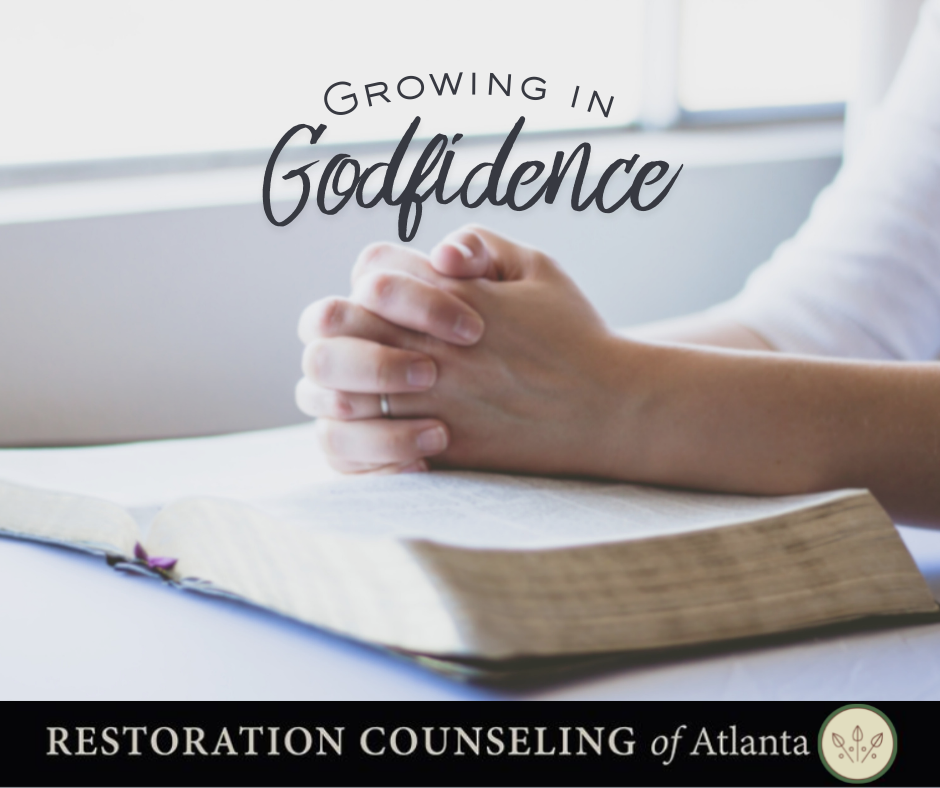Through God’s ongoing sanctification of my spirituality, I often struggle with the tug-of-war between humility and confidence. How can these two exist simultaneously? Can confidence be righteous or only self-righteous?
Confidence is a reaction to how we view ourselves. We measure success in comparison with friends, family, or even social media highlight reels. The source of our confidence can be found in our bank accounts, mirrors, or our list of accomplishments. When we feel in control, important, or independent, it brings us comfort. Like any emotion, comfort is temporary. Once life circumstances change, as they inevitably do, confidence can plummet. That’s the tricky thing about confidence; it’s a fickle facade, solely dependent on a circumstantial cultural definition. Because we are human, the capacity to view ourselves accurately is limited and conditional.
Godfidence is a reaction to how God views us. We are His beloved, valued, and desired to be in an intimate relationship with Him. We are created fearfully and wonderfully in His image. If we believe scripture to be true, then we should know these truths about ourselves and operate in a way that depicts the worth He has ascribed to us as adopted children into His family.
Unlike a cultural definition of worth, His love for us is limitless and unconditional. Operating out of Godfidence is a challenge that calls for constant spiritual maturation in faith. It does not measure our worth from self-righteous endeavors. Instead, it claims the blood of Christ as the full source of our righteousness from a grace-filled lens. Unlike confidence, Godfidence can coexist with humility and the fruit of the Spirit. Humility is not equal to lacking a sense of self-worth. It is being able to see ourselves adequately and accurately, through a frame of redemption.
How do we grow in Godfidence?
Examine every thought.
Remember: feelings aren’t facts. They are merely responses to momentary experiences. Our emotions can cloud our thoughts and judgments. Take captive the thoughts that invade your mind and examine them with curiosity before allowing them to take root.
Reframe every thought to be Scripturally sound.
Our world’s version of growing confidence can often be found in utilizing positive self-talk by stating personal affirmations into a mirror. You’re strong and courageous. You’re smart and confident. While affirmations may temporarily shift our mindset, they aren’t grounded in anything substantial. Affirmations from scripture, on the other hand, are rooted in Truth. This is the necessary benefit of knowing His Word and hiding it in our hearts, even in moments of uncertainty. His Word is life-breathed and all-enduring. We must take captive thoughts of fear or pride, and obediently correct these thoughts with scriptural truth.
Captive thought: I am worthless, disgusting…
Obedient thought: I am fearfully and wonderfully made (Psalm 139:14), in His image (Genesis 1:27)
Captive thought: No one cares about me…
Obedient thought: I am a chosen and adopted child of the King (Ephesians 1:5, Romans 8:14-19, Galatians 4:5-7, Psalm 27:10)
Speak Scripture aloud.
I challenge you to speak scripture aloud and prayerfully ask God to clarify and validate your worth in Him.
“For God has not given us a spirit of fear, but of power and of love and of a sound mind.” (2 Timothy 1:7)
“For I know the plans I have for you,” declares the Lord, “plans to prosper you and not to harm you, plans to give you hope and a future.” (Jeremiah 29:11).
“Fear not, for I am with you; Be not dismayed, for I am your God. I will strengthen you, Yes, I will help you, I will uphold you with My righteous right hand.” (Isaiah 41:10)
Consistently claim your eternal source of identity.
Cultural confidence will never be enough. The idealized figures we compare ourselves to for confidence do not long for a relationship with us, but God does! Alone, we are nothing. Through Him, we can live life with a supernatural Godfidence: knowing our worth, owning our identity as a child of the King, and building our purpose of bringing glory to Him through the good works He will faithfully complete in us (Philippians 1:6).

Written by Katharine LeCraw, MA
Roswell & Woodstock
katharine@restorationcounselingatl.com, ext. 120
Katharine LeCraw is a trauma-informed therapist eager to complete deep work with clients that promotes the healing of core wounds and spiritual freedom. With training in IFS, CBT, Child-Centered Play Therapy, Somatic Experiencing, and Person-Centered Therapy, Katharine utilizes a multi-modal therapeutic approach in order to provide the best care for her clients. Katharine works with a diverse population of clientele with a special focus on parenting issues, child and teen therapy, anxiety disorders, burnout, sexual trauma, core wounding, and attachment issues.

